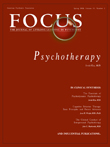From the Guest Editor
Despite the challenges psychiatrists have faced over the past decade from cost-containment and accountability efforts, the practice of psychotherapy continues to thrive. Indeed, psychotherapy is in an increasingly admirable scientific position because of research and educational advances, including the following:
| • | Neurobiological studies that have demonstrated changes in both brain structure and function from psychotherapeutic interventions | ||||
| • | Randomized studies (often with more than one type of psychotherapy) that have supported robust effect sizes that clearly demonstrate improved outcome for patients receiving psychotherapy | ||||
| • | Advances in cognitive neuroscience that provide scientific support for the power of implicit memory in identity formation, symptom formation, and treatment response | ||||
| • | Demonstration of the cost-effectiveness of psychotherapy | ||||
| • | Overwhelming evidence of the importance of psychotherapy in improving medication compliance | ||||
| • | Evidence of the inextricability of psychotherapy and medication in the treatment of persistent and severe mental disorders and the limits of psychopharmacological monotherapies | ||||
| • | Demonstration of the helpfulness of psychotherapy in treating trauma from early neglect and abuse | ||||
| • | Advent of effective manualized treatments that are readily teachable to residents and practitioners | ||||
| • | Stronger accreditation requirements for residency education in psychotherapy | ||||
For this issue of FOCUS, contributors were asked to present overviews that emphasize the clinical usefulness of three different psychotherapies. The scientific support for these treatments is, for the most part, highlighted in the reprinted articles and the bibliography. The contributors were challenged by a word limit of approximately 3,000 words; it was no small task to describe the vitality of psychodynamic, interpersonal, and cognitive behavior therapies in such concise articles. Hopefully, we have provided readers with an educational experience that will promote comprehensive care for our patients.



